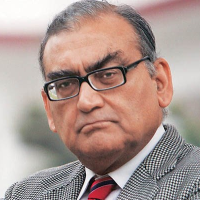Changes Proposed in Judges’ Appointment System
 Justice Katju's allegations on corruption in the top judiciary has shaken the existing collegium system
Justice Katju's allegations on corruption in the top judiciary has shaken the existing collegium system
The opaque system of judges appointing judges is set to be modified after recent allegations of corruption that have dogged the existing collegium system. Law Minister Ravi Shankar Prasad introduced the Judicial Appointments Commission Bill in the Lok Sabha on Monday, one day after former Supreme Court Judge Markandey Katju alleged that he had informed former Chief Justice of India S H Kapadia and three other ex-CJIs of the corrupt practices of a few High Court judges yet they had all failed to take action.
India is currently the only country in the world where judges appoint judges. The collegium system was implemented in 1993 after a verdict by the Supreme Court. At the time it was hailed as a guarantee against any political attempt to install a pliant judiciary. But the complete exclusion of the executive from the judicial appointment process created a system where a few judges appoint the rest in complete secrecy. This has resulted in alleged favouritism in certain cases, and a general decline in the quality of appointments.
The recent controversy over Justice Katju’s allegations on corruption in the top judiciary has shaken the existing system. He had earlier alleged that a “corrupt” Madras High Court judge was allowed to continue in office due to political pressure from the previous DMK-supported UPA administration.
Following the change in government, the new NDA administration began a process of consultation with eminent jurists to reach a consensus on a constitutional amendment bill to replace the collegium system. The proposed Judicial Appointments Commission (JAC) is expected to include the executive in the appointment of judges of the Supreme Court and High Courts.
Yet the composition of the six-member JAC has divided jurists, with several calling for judicial independence to not be compromised. Justice Katju said the JAC should include the Leader of Opposition in the Lok Sabha and one jurist nominated by the President.
On Monday, Chief Justice of India RM Lodha responded by defending the collegium system and warned of a “campaign to defame the judiciary and to tarnish its image in the eye of public.” He claimed that incorrect information was being spread about the functioning and decisions of the collegium.
Most jurists agree that transparency is required in the appointment of judges. According to senior advocate KTS Tulsi, “Whatever may be the composition of the JAC, it is important to strike a balance between judicial independence and judicial accountability. The real issue is not who (judiciary or executive) appoints the judges; but the manner in which they are appointed. Unless the entire process is transparent, the quality of appointment would not improve.”
- Top Stories
- Controversies
- Where is the Money Going?
- India and the World
- Appointments and Resignations
- Unusual News
- Latest News
- India College Chain’s Expansion into U.S. Draws Opposition from Massachusetts Officials over Quality of Education
- Milk Shortages in India Tied to Release of New Movies Featuring Nation’s Favorite Stars
- Confusion Swirls around Kashmir Newspaper Ban in Wake of Violent Street Protests
- Polio-Free for 5 Years, India Launches Vaccine Drive after Polio Strain Discovery
- New Aviation Policy Could Increase Service, Lower Ticket Prices






Comments